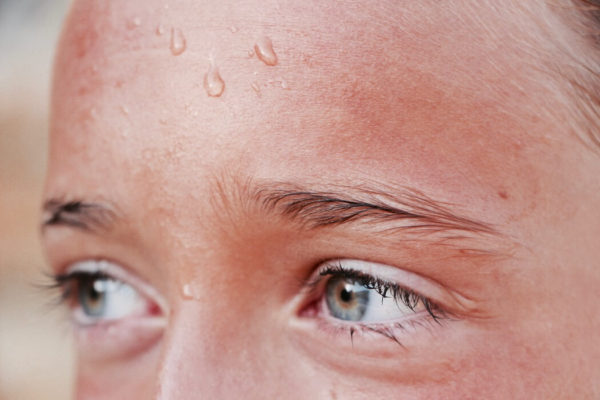It is no secret that sweating has the function of refreshing us, using our body’s water in the process, undoubtedly, and an important and essential function in the functioning of the body, although it can sometimes be uncomfortable and embarrassing for some people. However, all human beings sweat and sweating is an everyday part of our lives. But, beyond that there is still a lot we don’t know, so get ready for some curiosities about sweat that you possibly didn’t know.

Men sweat 40% more than women
Women have more sweat glands than men, but even so, it is men who actually produce more sweat. In recent studies of sweating patterns, researchers have found that when their subjects were under stress from high temperatures or intense exercise, regardless of how fit they were or how much body fat they had, men almost always beat women in this category.
In other words, female bodies can evaporate sweat more efficiently on their skin, which cools the body without a ton of sweat, unlike men.
More age equals less sweating
In other words, the older we get, the less we sweat. It’s as simple as that. This is a result of sweat glands shrinking and becoming less sensitive over time.
Each person’s sweat is unique
Like a fingerprint, sweat is unique to everyone. Its composition is a combination of compounds that is uniquely yours. So, while everyone sweats, no two people sweat the same.
The fitter you are, the more easily you will sweat.
For those who exercise frequently and as a result sweat frequently, their bodies begin to recognize and become more familiar with the sweating process than the average person’s body would. When they begin to exercise, their body goes on automatic to try to cool the body and begins to produce sweat sooner.
Sweat is odorless and colorless.
You may have smelled stinky sweat before. You may have also experienced sweat stains on a shirt you were wearing. While both scenarios are entirely possible, sweat is actually colorless and odorless. It is bacteria on the skin or reactions with chemicals on the skin that actually create the odor or color you may associate with sweat.
Sweating does not make us lose weight
This may be an unbelievable fact to many, but the reality is that sweat is only made up of water, salt and protein. So, once you drink water to rehydrate, the weight lost through sweat will return.
Sweat glands are not evenly distributed
There are 2.6 million sweat glands in the average human body, most of them in your hands and feet. With 250,000 glands in the feet this is the most concentrated area of sweat glands. Whereas, the least concentrated area of sweat glands is on the back. However, the reason why we feel that our armpits sweat so much is because the area is not very well ventilated, which makes it difficult for sweat to evaporate.
On the other hand, the only areas of your body that do not have sweat glands are your ears, lips and fingernails.
We sweat a lot
It has been shown that the average human being sweats about 278 gallons of sweat each year. This is believed to be enough to fill the gas tank of three mid-size SUVs.
Sweating does a lot of good
In addition to regulating our body temperature and cooling us down when necessary, sweating provides many other benefits that help maintain our body’s well-being. Dermcidin, for example, is an antibiotic peptide found in sweat that regulates bacterial growth on the skin and even helps fight certain infections.
Our body does not form new sweat glands after birth.
The sweat glands we are born with are the same sweat glands we will have for the rest of your life, as our body cannot form new ones after birth.
Certain foods can cause you to sweat more
This may be because they increase your metabolism which, in turn, increases your body temperature, causing your body to produce sweat to cool you down.
Food can make us sweat
Some people start sweating when they eat, especially spicy foods. This is called gustatory hyperhidrosis. The sweating usually appears on the face, neck and scalp. Some people will even start sweating just by smelling or thinking about food.
Emotions can change the smell of sweat
It has been scientifically proven that emotions trigger changes in the chemical composition of sweat. In an Austrian study, participants used pads to collect sweat while watching horror movies on the first day and then neutral movies the next day. A second group of volunteers smelled the pads and could recognize which pads were used during the thriller.
This dirtier smelling sweat is also known as stress sweat. Some of the more putrid and profuse sweat comes from situations of high emotion and high stress.
The faster we sweat, the saltier the sweat will be.
As sweat travels to the sweat gland, some salt or sodium is reabsorbed through the sweat glands. But if the sweat moves quickly, the sweat gland will have less time to reabsorb the sodium. This will make the sweat that reaches the surface of the skin saltier.
It is estimated that 360 million people worldwide suffer from extreme sweating.
Unfortunately, there are people who sweat excessively all the time and for no reason. This condition is known as hyperhidrosis. People suffering from hyperhidrosis often experience excessive underarm sweating, sweaty handshakes and other uncomfortable sweating.
Humans can sweat blood
This is a rare condition called hematohidrosis. It is a condition in which the capillary blood vessels that feed the sweat glands rupture, causing them to discharge blood. This occurs under conditions of extreme physical or emotional stress, although it is such a rare condition that not many cases have been reported.


ALFA